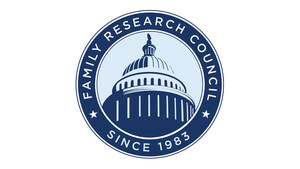WASHINGTON, Dec. 7, 2012 /PRNewswire-USNewswire/ -- Today the U.S. Supreme Court accepted petitions to review two court decisions that challenge the constitutionality of marriage as the union of one man and one woman. The federal case, Windsor v. United States, involves the Defense of Marriage Act. The second case, Hollingsworth v. Perry, deals with California's marriage amendment, Proposition 8.
(Logo: http://photos.prnewswire.com/prnh/20080930/FRCLOGO)
Family Research Council (FRC) has had a long-standing interest in preserving the natural definition of marriage. FRC was instrumental in the legislative process that crafted and enacted the Defense of Marriage Act (DOMA) in 1996. More recently, FRC, in conjunction with the Thomas More Society of Chicago, Illinois, filed amicus briefs in two of the marriage cases for which Supreme Court review had been requested. Those filings supported the Defense of Marriage Act (DOMA) in the case arising out of the U.S. Court of Appeals for the First Circuit (Gill) and in the Proposition 8 case (then called Perry v. Schwarzenegger).
Family Research Council President Tony Perkins made the following comments regarding the decision:
"Virtually nothing is more important to the future of our country than marriage and the family. This is why we are pleased that the Supreme Court has decided to examine lower court decisions striking down the Defense of Marriage Act and Proposition 8. It was completely appropriate for Congress, using DOMA in 1996, to create uniformity in federal law and explicitly confirm that 'marriage' would be between one man and one woman for federal purposes – as it always had been. Since President Bill Clinton signed DOMA into law, 30 states have followed suit by incorporating the definition of marriage into their constitutions.
"Should the Supreme Court decide to overturn the marriage laws of 41 states, the ruling would become even more divisive than the Court's infamous Roe v. Wade decision. Marriage, unlike abortion laws in the 1970s, has been incorporated into the state constitutions of 30 states. Voters in these states will not accept an activist court redefining our most fundamental social institution.
"However, we remain confident that in the end, the U.S. Supreme Court will recognize that DOMA is supported by numerous legitimate legislative purposes – all of which are consistent with our principles of federalism. The argument that the authors of our Constitution created or even implied a 'right' to redefine 'marriage' lies outside our constitutional law.
"Additionally, we believe that the people's vote on Proposition 8 should be respected. Activist courts like the U.S. Court of Appeals for the Ninth Circuit should not overturn their decision. We hope the Supreme Court will recognize the right of the people to uphold marriage as it has always been defined," concluded Perkins.
FRC's amicus brief in Gill: http://www.frc.org/legalbrief/commonwealth-of-massachusetts-v-us-department-of-health-and-human-services
FRC's Amicus brief in the Proposition 8 case: http://www.frc.org/legalbrief/amicus-breif-on-perry-v-schwarzenegger
SOURCE Family Research Council
WANT YOUR COMPANY'S NEWS FEATURED ON PRNEWSWIRE.COM?
Newsrooms &
Influencers
Digital Media
Outlets
Journalists
Opted In





Share this article